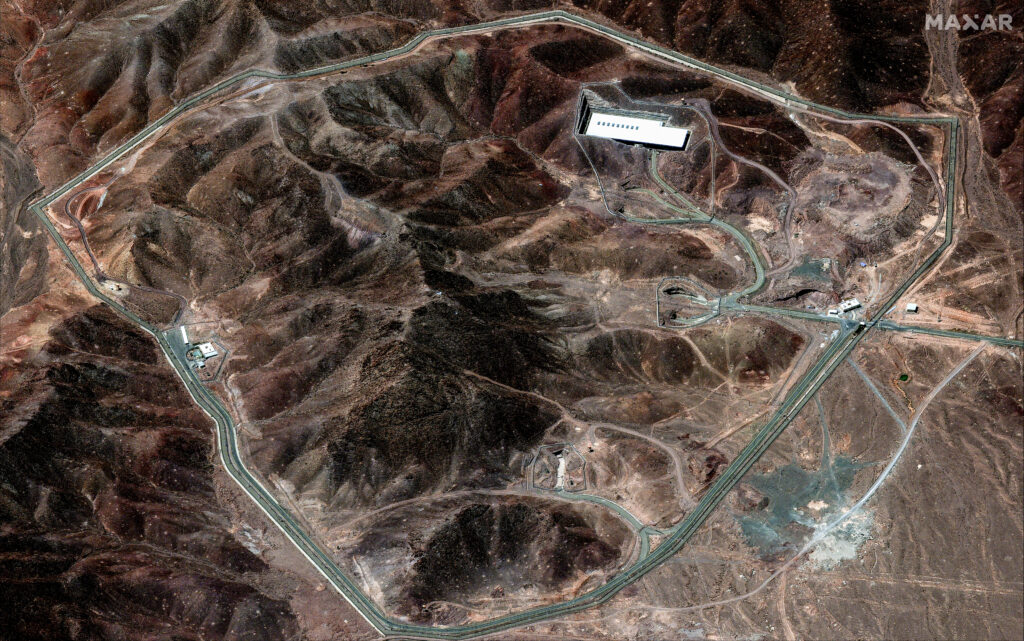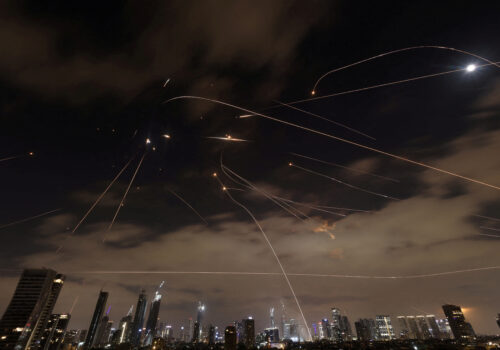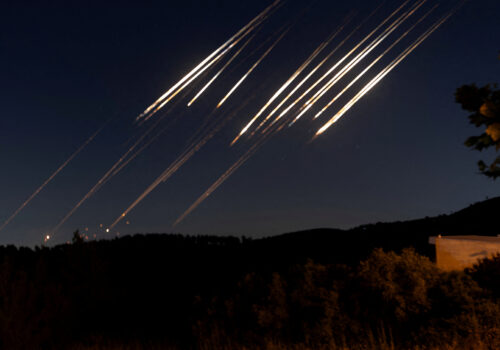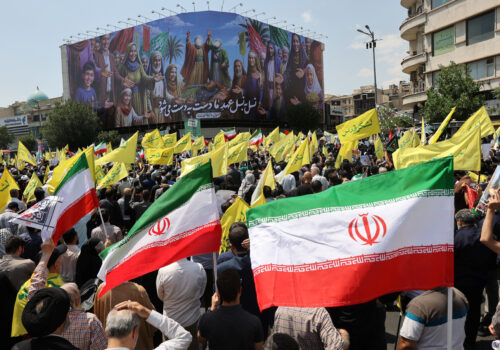The Israel-Iran war is coming down to a single question: What should be done about the hardened Iranian nuclear facility at Fordow? If Israel lacks the capability to destroy it, and if a diplomatic solution is not realistic, then US President Donald Trump should authorize the US bombing of Fordow and other remaining nuclear program infrastructure in Iran.
But doing so must come with a condition: Israeli Prime Minister Benjamin Netanyahu declares Israel’s objectives accomplished and ends the war.
There are three options to end Iran’s nuclear program. The first and most preferred is diplomacy. If Iran is willing to come back to the negotiating table, as Trump has sought—and as Iran reportedly might be willing to do, despite public protestations—then it must do so from a starting point of giving up its right to domestic enrichment and agreeing to dismantle all of its nuclear sites. Moreover, dismantlement should be undertaken by international experts, not by Iranian personnel.
The second option is Israel striking on its own. Already in this war the world has seen Israel’s military and operational ingenuity. If it exists for Fordow, as well, then Israel should be responsible for applying it without further aid or support from the United States, despite Israel preferring assistance from Washington.
There is a third possibility. If Israel lacks the capability to destroy Fordow and if diplomacy is insufficient, then the United States will have to make a choice to bomb Fordow or not. It should bomb.
Fordow, Trump, and the future of the Middle East
Already there are critics of Trump even considering this possibility. If he moves ahead, there will be more. Many in the Trump administration will object. They will insist that a decision to get involved in Israel’s campaign against Iran bogs down the United States in the region for years, just as it was starting to extricate itself. Some will say it delays a necessary refocus on China. Others in the Make America Great Again movement will protest that Trump is going back on his word not to engage in more wars in the Middle East and not to fight others’ wars.
This criticism exaggerates the consequences of exactly what is being proposed. No one is seriously advocating for a multi-year US war like in Iraq, especially not for the deployment of US boots on the ground in Iran, which should be a nonstarter. The view that bombing Fordow would delay the United States from focusing on China would be more apt if what was being proposed was a multi-year war. Critics should also recognize that the geography of the Middle East is central to much of global commerce.
Of course there are risks. The United States bombing Fordow could prompt an expansion of the war into a regional conflict, resulting in strikes on US forces and interests in the region, as well as those of major Arab partners. That is a serious consideration.
Many Arab partners, including Saudi Arabia, have spent the past few years reversing course on their policy toward Iran. Not confident that the United States would provide an adequate security umbrella in the event they were targeted by Iran or its proxies, Saudi Arabia and the United Arab Emirates (UAE) have gone from being the biggest champions of a hardline “maximum pressure” approach toward Iran a decade ago, to seeking rapprochement with Tehran more recently.
Today, those same countries are worried that an expanded conflict will result in their being targeted for hosting US bases and allying with the United States. It’s a legitimate concern. If the Iranian regime feels that it is at risk, then Tehran may target Gulf allies to try to pressure them to convince the United States to end the war.
In extremis, the targeting of Gulf states and their oil and gas platforms and infrastructure could send oil prices soaring and serve as a long-term disruption to the primary source of revenue for these states. Even if only targeting US bases in Gulf states, Iranian missiles and rockets raining down would drive up fear and insecurity among Gulf populations. That would in turn risk societal shocks if these populations—especially the less homogeneous populations, such as Bahrain’s—then seek to hold their respective monarchies personally responsible.
But those risks must be weighed against how long and intense that threat would last given Iran’s diminished strike capabilities, its already weakened state, and the regime’s perpetual overriding goal to ensure its survival, which becomes less and less likely with every strike Iran takes against US interests.
Perhaps the most damning criticism of Trump agreeing to strike Fordow would be that Israel said it would undertake this war on its own, and now the president is getting dragged into Israel’s conflict. That would be absolutely true—and rightly frustrating.
But setting aside any anger and frustration with Israel will allow Trump—and all US policymakers—to answer the only question that actually matters upon the conclusion of the war: Is the United States better off with an Iran whose nuclear program remains advanced and closer than ever to having a bomb, or an Iran that no longer has a nuclear program capable of producing a weapon in the near future? The answer is the latter.
Bombing what remains of Iran’s nuclear program that Israel lacks the capability to destroy, most prominently Fordow, should be the only focus of US military action in Iran—and only taken if Netanyahu agrees to end the war, limiting any ambitions he might have related to regime change. If Netanyahu doesn’t agree, then he may struggle to explain to his public why he’s declining a US offer to eliminate the threat most Israelis have long viewed as existential.
Bombing will probably ensure some level of Iranian retaliation in the region against the United States, not unlike Trump’s decision to kill Qasem Soleimani, then the chief of the Islamic Revolutionary Guard Corps Quds Force, in 2020. But if Iran’s response is as proportionally limited as it was then, then it would enable a narrow path for the United States and Israel to declare victory and set the Middle East on a new and fundamentally different road filled with increased opportunity.
Iran’s nuclear future is the region’s future
Tehran will view it as a fundamental victory if the war ends and its nuclear program is still capable of producing enough enriched uranium for a nuclear weapon in weeks and the weaponization of that fissile material in just a few months. Iran would retain the ability to rush for a bomb in the short term or hold this potential as a perpetual Sword of Damocles hanging over the region.
For the regime, Iran’s nuclear program is critical to its own stability and survivability. It is a security blanket that helps to protect it from its enemies, including Israel. Iranian leaders would be buoyed by its survival and the threat projection it produces toward the region.
Such a scenario is likely to energize the regime and increase the potential that it doubles down on its current path of domestic repression while seeking to rebuild its international influence and proxy networks. Even minimal success in doing so would risk undermining Lebanon, which is in the nascent stages of emerging from decades under the whims of Hezbollah. It would also be a challenge in Syria, where Ahmed al-Sharaa’s leadership, while fragile and flawed, offers the best chance for a country free from the threat of the Islamic State or dominance and safe haven for Iran and Russia.
An Iran with a nuclear program at the end of the war portends a more violent region for years to come, with Israel and Iran constantly engaged in hostilities and war with no potential for that conflict to retreat to the shadows.
What’s more, any potential for a two-state solution and a future Palestinian state will be off the table. Israel will insist that so long as Iran remains an existential threat, especially a resurgent one energized to reestablish its regional position—including funding, training, and supporting terrorist actors and proxies—there is nothing to discuss.
Trump’s tricky calculus
Trump’s trip to the Middle East in May demonstrated his view of the importance of the region to the United States. Whether the assessment is accurate or exaggerated, Trump has made clear from the agreements he signed that he views the Gulf—especially Saudi Arabia, the UAE, and Qatar—as a critical partner for long-term US economic success. At the same time, he remains anxious to build upon his most successful first-term foreign policy endeavor, the Abraham Accords. Both efforts are significantly more challenging if Iran continues to have a nuclear program.
But disabling the nuclear program is where this mission should end. While there are many who would prefer Israel use the war to foment or drive regime change in Iran, Trump has already indicated that he is not inclined to support such an effort.
That’s the right call, because regime change does not necessarily equate to democracy. More likely, it would result in a military-dominated state—one that would initially be even more hardline toward Israel and the region. For regime change in Iran to be legitimate and successful long-term, it needs to come from the Iranian people, not with the proximate instigator being Iran’s arch-enemy.
The war has already begun. At the end of it, Iran will have a viable nuclear program, or it won’t. The future of the Middle East will be driven by the answer.
Jonathan Panikoff is the director of the Atlantic Council’s Scowcroft Middle East Security Initiative and a former deputy national intelligence officer for the Near East at the US National Intelligence Council.
Further reading
Mon, Jun 16, 2025
Twenty questions (and expert answers) on the Israel-Iran war
MENASource By
The escalation between Israel and Iran has raised many important questions about a region already facing crises on multiple fronts.
Mon, Jun 16, 2025
How the US can reduce the risk of wider war in the Middle East
New Atlanticist By Caroline Zier
Five steps taken now can help put the White House in a better position to manage the spiral of escalation between Israel and Iran.
Fri, Jun 13, 2025
After Israel’s strikes on Iran, these four questions could determine the Middle East’s future
New Atlanticist By Jonathan Panikoff
The trajectory of the Middle East could be determined by how just a few critical questions are answered the coming days and weeks.
Image: A satellite image shows the Fordo nuclear facility in Iran in this handout image dated June 14, 2025. Maxar Technologies/Handout via REUTERS THIS IMAGE HAS BEEN SUPPLIED BY A THIRD PARTY MANDATORY CREDIT NO RESALES. NO ARCHIVES MUST NOT OBSCURE LOGO



